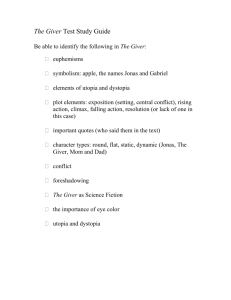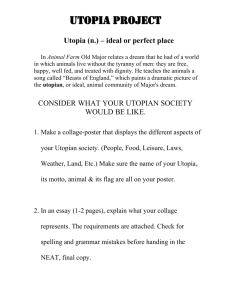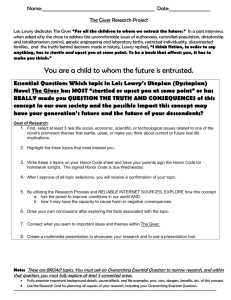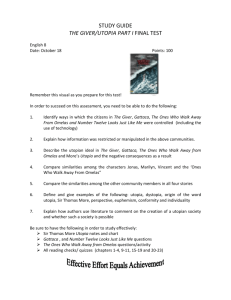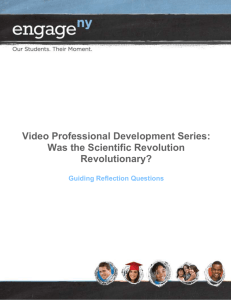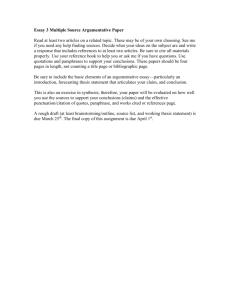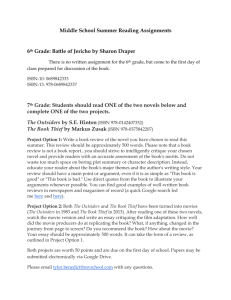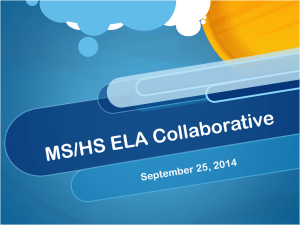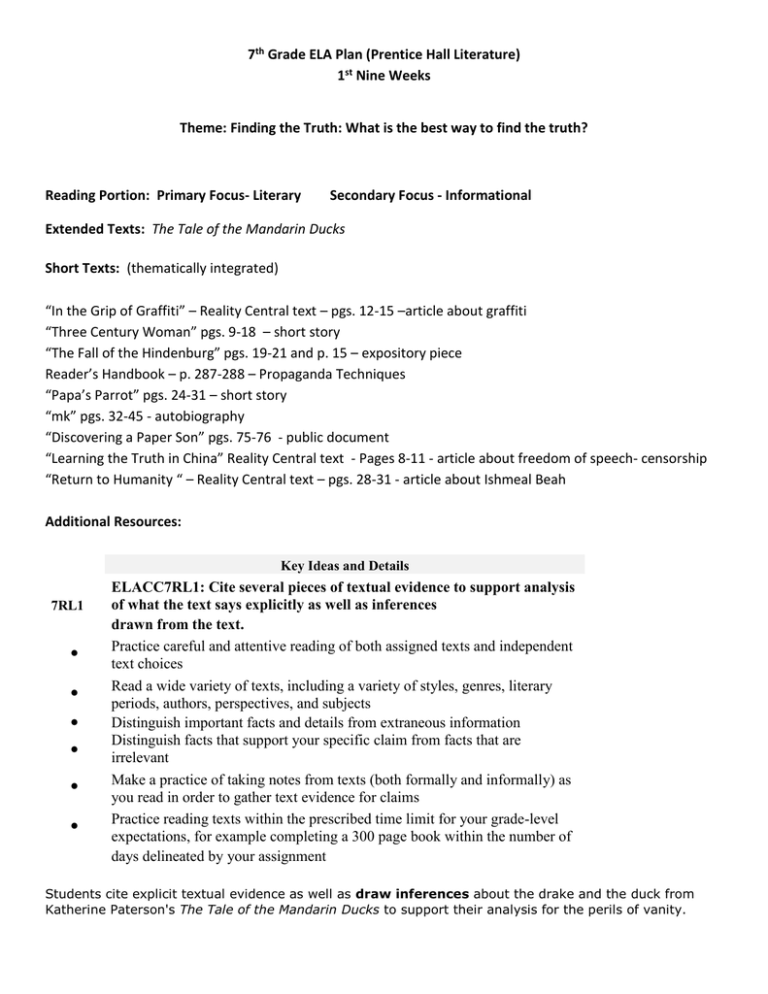
7th Grade ELA Plan (Prentice Hall Literature)
1st Nine Weeks
Theme: Finding the Truth: What is the best way to find the truth?
Reading Portion: Primary Focus- Literary
Secondary Focus - Informational
Extended Texts: The Tale of the Mandarin Ducks
Short Texts: (thematically integrated)
“In the Grip of Graffiti” – Reality Central text – pgs. 12-15 –article about graffiti
“Three Century Woman” pgs. 9-18 – short story
“The Fall of the Hindenburg” pgs. 19-21 and p. 15 – expository piece
Reader’s Handbook – p. 287-288 – Propaganda Techniques
“Papa’s Parrot” pgs. 24-31 – short story
“mk” pgs. 32-45 - autobiography
“Discovering a Paper Son” pgs. 75-76 - public document
“Learning the Truth in China” Reality Central text - Pages 8-11 - article about freedom of speech- censorship
“Return to Humanity “ – Reality Central text – pgs. 28-31 - article about Ishmeal Beah
Additional Resources:
Key Ideas and Details
7RL1
●
●
●
●
●
●
ELACC7RL1: Cite several pieces of textual evidence to support analysis
of what the text says explicitly as well as inferences
drawn from the text.
Practice careful and attentive reading of both assigned texts and independent
text choices
Read a wide variety of texts, including a variety of styles, genres, literary
periods, authors, perspectives, and subjects
Distinguish important facts and details from extraneous information
Distinguish facts that support your specific claim from facts that are
irrelevant
Make a practice of taking notes from texts (both formally and informally) as
you read in order to gather text evidence for claims
Practice reading texts within the prescribed time limit for your grade-level
expectations, for example completing a 300 page book within the number of
days delineated by your assignment
Students cite explicit textual evidence as well as draw inferences about the drake and the duck from
Katherine Paterson's The Tale of the Mandarin Ducks to support their analysis for the perils of vanity.
7RI1
ELACC7RI1: Cite several pieces of textual evidence to support analysis
of what the text says explicitly as well as inferences drawn from the text.
Practice careful and attentive reading of both assigned texts and independent
text choices
Read a wide variety of texts, including a variety of styles, genres, historical
periods, authors, perspectives, and subject
Exhibit knowledge of what “analysis” means as compared to summary,
paraphrase, or argument from opinion (analysis is the positing of a thesis
about a text based
solely on an unbiased evaluation of the rhetorical elements, e.g., appeals to
logic, emotion, or authority, parallelism, logical fallacies, diction)
Produce evidence from the text for all claims and inferences, both in formal
academic work and collaborative discussion
Annotate texts as you read, both formally for analytical reference, and
informally to cement comprehension
Distinguish between evidence that strongly supports a claim or position, and
details that may be irrelevant or extraneous
The Tale of the Mandarin Ducks Resources
http://www.heartwoodethics.org/resources/culturekey.php?num=36&pg=4
http://www.ehow.com/about_6614217_mandarin-duck-diet.html
Paterson, Katherine. The Tale of the Mandarin Ducks. Illustrated by Leo and Diane Dillon. New York: Lodestar Books,
1990. (1990)
Long ago and far away in the Land of the Rising Sun, there lived together a pair of mandarin ducks. Now, the drake
was a magnificent bird with plumage of colors so rich that the emperor himself would have envied it. But his mate,
the duck, wore the quiet tones of the wood, blending exactly with the hole in the tree where the two had made their
nest.
One day while the duck was sitting on her eggs, the drake flew down to a nearby pond to search for food. While he
was there, a hunting party entered the woods. The hunters were led by the lord of the district, a proud and cruel man
who believed that everything in the district belonged to him to do with as he chose. The lord was always looking for
beautiful things to adorn his manor house and garden. And when he saw the drake swimming gracefully on the surface
of the pond, he determined to capture him.
The lord’s chief steward, a man named Shozo, tried to discourage his master. “The drake is a wild spirit, my lord,” he
said. “Surely he will die in captivity.” But the lord pretended not to hear Shozo. Secretly he despised Shozo, because
although Shozo had once been his mightiest samurai, the warrior had lost an eye in battle and was no longer handsome
to look upon.
The lord ordered his servants to clear a narrow way through the undergrowth and place acorns along the path. When
the drake came out of the water he saw the acorns. How pleased he was! He forgot to be cautious, thinking only of
what a feast they would be to take home to his mate.
Just as he was bending to pick up an acorn in his scarlet beak, a net fell over him, and the frightened bird was carried
back to the lord’s manor and placed in a small bamboo cage.
From THE TALE OF THE MANDARIN DUCKS by Katherine Paterson, illustrated by Diane and Leo Dillon. Text © 1990
by Katherine Paterson. Illustrations © 1990 by Diane and Leo Dillon. Used by permission of Dutton Children’s Books, A
Division of Penguin Young Readers Group, A Member of Penguin Group (USA) Inc, All rights reserved.
Integration of Knowledge and Ideas
ELACC7RL9: Compare and contrast a fictional portrayal of a time,
place, or character and a historical account of the same period as a
means or understanding how authors of fiction use or alter history.
7RL9
**
**
●
**
●
7RI6
Work to construct background knowledge of historical and literary eras
Apply knowledge of rhetorical strategies and bias in evaluating fictional and
historical documents from the same period
Understand and apply the concepts of allusion and allegory
Generalize concepts of setting, plot, characterization, and other narrative
elements and relate these elements to their real-world counterparts
Purposefully choose texts from a variety of authors, geographical and
cultural contexts, genres, and literary periods
ELACC7RI6: Determine an author’s point of view or purpose in a text
and analyze how the author distinguishes his or her position from that of
others.
Recognize and trace the development of an author’s argument, point of view,
or perspective in text
Distinguish between Point of View as in narrative voice (first person,
omniscient, etc.) and Point of View as in opinion or perspective
Be alert for author bias both when it is overt and when it subtle; subtle bias is
often expressed through diction (“she left the party” compared to "she fled
the party")
Understand and apply knowledge of exploration of counter-claims within an
argument or opinion piece
Practice summarizing works without editorial bias and be alert for
unintended bias in your own work
“Three Century Woman” pgs 9-18 – short story
“The Fall of the Hindenburg” p.19 – expository piece
GPS – ELA7RC2 – Author’s Purpose
CCGPS – ELACC7R16 – Author’s Purpose
Meet the Author - Richard Peck Pgs. 4-5 and SEE IT! CD
Critical Viewing - “Three Century Woman” – Pages 12-13, and 15
Background – Airships
Critical Viewing - “The Fall of the Hindenburg” – Page 20
Graphic Organizer for Compare and Contrast
Nonfiction – Historical Account
Fiction
“The Fall of the Hindenburg” p.19
“Three Century Woman” p. 9 –
short story
May 1937
May 1937
(Background Knowledge)
Traveling from Europe
Traveling from Europe
(Background Knowledge)
Landed at Lakehurst, New Jersey
Landed at Lakehurst, New Jersey
(Background Knowledge)
She was on the Hindenburg
She walked away
Her dress was burned
Hindenburg Resources (Historical)
are available below.
Great-grandma refers (allusion) to
real disasters such as the San
Francisco earthquake and the
explosion of the Hindenburg.
Compare and Contrast
Same (Setting or time period is the
same)
Same (Plot or information about
the flight is the same)
Same (Plot or information about
the landing is very similar.)
Different (P. 14 “She’s never been
west of Denver.”)
Different (Viewing the historical
documentary reveals this is highly
unlikely.)
Different (Viewing the historical
documentary reveals this is highly
unlikely.)
Contrast – She was not telling the
truth, but she wants the reporter
to think that she is. So she takes a
minute to ponder, or think deeply,
to make it appear as if she’s trying
to remember what happened.
ESSAY #2 is the writing assessment to this CCGPS.
Hindenburg Resources
http://www.history.com/topics/hindenburg/videos#blimps-dirigibles-and-airships
http://www.airships.net/hindenburg/disaster
http://score.rims.k12.ca.us/score_lessons/samurai_resume/index.html
http://video.pbs.org/video/115057849
Reading Informational – Key Ideas and Details
7RI5
ELACC7RI5: Analyze the structure an author uses to organize a text,
including how the major sections contribute to the whole and to the
development of the ideas.
Analyze and evaluate common textual features (e.g., paragraphs, topic
sentences, introduction, conclusion, footnotes, index, bibliography)
Analyze and evaluate common organizational structures (e.g. graphic
organizers, logical order, cause and effect relationships, comparison and
contrast)
Review and apply knowledge of varying sentence structures, noting those
that are most effective in a given text (beginning with a subordinate clause
for example,
or the effective placement of phrases and modifiers)
Recognize the effective placement of topic sentences in informational
documents
Note the differences in structure for paragraphs that present evidence,
provide a quote, share an anecdote, or include other types of support
Reader’s Handbook – p. 287-288 – Propaganda Techniques
7RI8
ELACC7RI8: Trace and evaluate the argument and specific claims in a
text, assessing whether the reasoning is sound and
the evidence is relevant and sufficient to support the claims.
Use information from a variety of consumer, workplace, and public
documents (e.g., job applications, contracts, instructions) to explain a
situation or decision or to solve a problem
Apply knowledge of common organizational structures for arguments (cause
and effect for example)
Acquire or review knowledge of the types of logical fallacies commonly
used in argument (see Teacher Guidance Document)
Acquire or review knowledge of syllogisms, inductive reasoning and
deductive reasoning
Make it a practice to provide valid and logical evidence and support for all
claims, formal or informal, and require the same from discourse with others
Informational Texts
Maps of Asia – p. 73-74
Reader’s Notebook Pgs. 42-44
“Discovering a Paper Son” pgs. 75-76 - public document
Writing a friendly letter (Eng. - pages 43 and 791 –PH Writing and Grammar)
7W3
ELACC7W3: Write narratives to develop real or imagined experiences
or events using effective technique, relevant descriptive details,
and well-structured event sequences.
a. Engage and orient the reader by establishing a context and point of view
and introducing a narrator and/or characters; organize an event
sequence that unfolds naturally and logically
b. Use narrative techniques, such as dialogue, pacing, and description, to
develop experiences, events, and/or characters.
c. Use a variety of transition words, phrases, and clauses to convey sequence
and signal shifts from one time frame or setting to another.
d. Use precise words and phrases, relevant descriptive details, and sensory
language to capture the action and convey experiences and events.
e. Provide a conclusion that follows from and reflects on the narrated
experiences or events.
7SL6
ELACC7SL6: Adapt speech to a variety of contexts and tasks,
demonstrating command of formal English when indicated or
appropriate.
“Papa’s Parrot” pgs. 24-31 – short story
Dramatic reading – Papa’s Parrot – p. 47 “Listening and Speaking” A rubric for grading is on page 183.
7RL10
ELACC7RL10: By the end of the year, read and comprehend literature,
including stories, dramas, and poems, in the grades 6-8 text complexity
band proficiently, with scaffolding as needed at the high end of the
range.
Practice careful and attentive reading of both assigned texts and independent
text choices
Read a wide variety of texts, including a variety of styles, genres, literary
periods, authors, perspectives, and subjects
Use annotation, note-taking
Read within appropriate time frame for extended text
Choose works from multiple genres, cultures, and literary periods
Consider keeping a notebook of texts read with notes, annotations, and any
relevant student work produced
Use self-correction when subsequent reading indicates an earlier miscue
(self-monitoring and self-correcting
Read with a rhythm, flow, and meter that sounds like everyday speech
(prosody)
“mk” pgs. 32-45 - autobiography
Writing Portion: Primary Focus-Informative/Explanatory
4-6 Informative Analysis Essays (include 1 Argumentative Essay)
1. Narrative - detailing a real or imaginative experience – Different people have different ideas about
what is true. Their ideas depend on how they perceive, or see, the world or what they believe. Write a
story from an experience in your childhood about what you thought was true. (the tooth fairy, the
boogey man)
2. Narrative – After reading The Tale of the Mandarin Ducks, think about the contrasting (opposite)
values of greed and caring. Think about how the lord’s greed failed, in the end, to get him what he
wanted, and how Yasuko and Shozo’s caring and selflessness resulted in a happy ending for the two of
them. Write a brief one page narrative about a time in your life when greed or kindness ruled your
decision-making. How did it feel to be greedy? To be kind?
3. Informative/Explanatory - Using the two texts, “Three Century Woman” and “The Fall of the
Hindenburg”, complete the graphic organizer on page 21. Compare and contrast the actual historical
event and the stories told by great grandmother Breckinridge. Refer to and cite great grandma’s
comments to the reporters to reflect insight into her character.
4. Informative/Explanatory - Using the story, “Papa’s Parrot” and explain why Harry and his friends visit
Mr. Tillian after school, then infer why Harry and his friends stopped visiting him as they grew older.
Analyze why Mr. Tillian bought Rocky (the cause) and how that affects their relationship. Why Does
harry react the way he does when Rocky says, “Where’s Harry?” and “Miss him!”
5. Argumentative – You have read “Papa’s Parrot.” The Big Question is “What is the best way to find the
truth?” In “Papa’s Parrot,” Rocky, the parrot, reveals the truth about Mr. Tillian missing his son. Using
your knowledge of the text, consider if it would have been better for Harry to have learned the truth
from his father instead of the parrot. Decide which way to learn the truth is better and cite evidence
from the text to support your claim.
6. Informative/Explanatory – In “Byron Yee: Discovering a Paper Son,” Byron Yee describes the plight of
Chinese immigrants arriving in America. Write a letter from the perspective of a “paper son,” like Byron
Yee’s father, arriving in America for the first time. Write to your family and describe your experiences.
Use the public document you have read to add details to your letter.
7. Informative/Explanatory – This big question for this 9 week period is: What is the best way to find
the truth? Using the knowledge you have gained from reading passages in this unit, what can passages
about events in history and from our past teach us about ourselves?
2-3 Short Research Connections:
a. Hindenburg – have students do research on zeppelins: their design, origin, history, amenities, and
reasons for its disaster.
b. Samurai – research the life of samurai and how their lifestyle was- is there a place for those types of
behaviors in today’s society? Art project on samurai soldiers, lifestyle, culture
c. Dramatic reading – Papa’s Parrot – p. 47 “Listening and Speaking” A rubric for grading is on page 183.
d. Research the Author – Richard Peck – (Eng.)
Routine Writing Examples
Cornell Notes
Letter Writing
Predictions and Inferences
Themes
After reading The Tale of the Mandarin Ducks – write what you think life was like for Yasuko and Shozo
after they were rescued. Infer what you think their life will be like based on what you have learned
about them from the story.
character analysis
compare and contrast characters
p. 2 – Make a list of things you know to be true.
p. 2 – Write a story from childhood
pp. 6-7 – Elements and types of fiction and nonfiction
p. 76 – Paper Son – How did Byron Yee begin to find the truth about his father’s immigration to the
United States?
practice writing summaries
practice summarizing without bias
Reality Central – p. 31 – After reading the article “Return to Humanity,” do you think events in our lives
shape the truth of who we are? If so, how much?
Vocabulary
The Tale of the Mandarin Ducks
Unit 1- Literature Book Vocabulary
drake
drake vs. duck
folktale
executed
banish
servant
plumage
inseparable
messenger
garment
mock
awareness
believable
conclude
convince
debate
evaluate
evidence
explain
factual
fiction
insight
nonfiction
perceive
reality
reveal
truth
Papa’s Parrot
Three Century Woman
merely
clusters
ignored
shipments
resumed
perch
truth
reveal
intersection
pondered
venerable
millennium
bickered
attribute
The Fall of the Hindenburg
Discovering a Paper Son
vessel
zeppelin
majestic
sabotage
hover
inferno
flammable
immigrant
invasion
decipher
detached
interrogation
prohibiting
legitimate
scrutiny
mk
international
relation
boarder
overwhelmed
adequate
deceive
transformation
ignorant
quest
crevice
warlord
wallflower
dormitory
7th Grade ELA Plan (Prentice Hall Literature)
2nd Nine Weeks
Theme: Life Lessons: What Should We Learn?
Reading Portion: Primary Focus-Informational
Secondary Focus-Literary
Extended Text: “Freedom Walkers”
Short Texts: (thematically integrated)
“The Bear Boy” p. 220 – short story
“Rikki Tikki Tavi” p. 228 – short story
“Melting Pot” p. 296 – short story
“The Third Wish” p. 311 – short story
“The People Could Fly” p.1010 – folk tale
“Mother to Son” – p. 612 – figurative language
“The Titans Remember” (in Reality Central textbook) p. 93
“A Christmas Carol” p. 740 - drama
Additional Resources:
Freedom Walkers Resources –
http://www.lesliepreddy.com/yhba/08-09/Intermediate/FreedomWalkers-Mauch.pdf
http://moreallicms.wikispaces.com/file/view/Microsoft+Word+-+civil+rights-IT.pdf
http://www.history.com/topics/selma-montgomery-march/videos#civil-rights-act-of-1964
http://www.history.com/topics/fannie-lou-hamer/videos#civil-rights-act-of-1964
http://www.bcri.org/resources/docs/curriculum.pdf
http://www.civilrightsmuseum.org/wp-content/uploads/NCRMCurriculum-Guide2011.pdf
http://www.civilrightsmuseum.org/wp-content/uploads/NCRMScavengerHunt_Grades6-12.pdf
Videos (multimedia) – “Rikki Tikki Tavi”, “Remember the Titans”
A Christmas Carol resources -
http://www.learnoutloud.com/Podcast-Directory/Literature/European-Classics/A-Christmas-Carol-by-CharlesDickens-Audio-Book-Podcast/23094
http://www.bbc.co.uk/learning/schoolradio/subjects/english/a_christmas_carol
Writing Portion: Primary Focus-Argumentative
1. Informative/Explanatory - After reading “The Titans Remember” you know more about the lessons
people can learn from those who are different. For example, sports teams are made up of people who
are not alike. However, good sports teams are alike in one way. They put aside differences to achieve
success. Write a paragraph to explain this lesson learned from the “Titans.” Use and cite evidence from
the text using the terms: analyze, background, facts, interview and understand, as noted in the text.
2. Narrative – After reading “Seventh Grade,” decide what advice would you give Victor about the way he
tries to impress Teresa. What does Victor probably learn from his experiences in seventh grade? Write
a short narrative essay detailing your advice and lessons learned. Be sure to cite evidence from the
text.
3. Narrative – After reading “Freedom Walkers” and learning more background information about
segregation and the state of our country during that period of time, think about what it means to be
someone who wanted peace and preached that love was more important than skin color. We have
studied the work of Dr. Martin Luther King, Jr. He strongly believed that, “we must meet hate with
love.” Write a poem that extends the meaning of this quote to our daily lives and to how we treat
others.
4. Argumentative – Think about bear boy’s relationship with his father in “The Bear Boy.” Also, consider
how the story ends. Decide if the bear boy’s time with the bear cubs and mother bear influenced his
current relationship with his father. In this Native American folktale the lesson is taught that parents
have a responsibility to love their children and teach them all the things they will need to know. Do you
think the lesson applies to people of all cultures? Defend your claim with evidence from the story and
personal experience.
5. Argumentative - After reading “The Third Wish” decide whether you believe Mr. Peters used his
wishes wisely. What evidence from the story makes you feel that way? What evidence from the story
makes you feel that way? In an essay, support your claim with evidence from the text.
6. Argumentative – After reading “Melting Pot” make a judgment. Do you believe it is possible to belong
to both groups: new arrivals and long-time residents? Quindlen would suggest that being tolerant and
interested in people from all backgrounds will help people get along. How is Quindlen both “one of
them” and “one of us?” Cite evidence from the text to support your judgment.
2-3 Short Research Connections:
a. Before reading “Rikki Tikki Tavi” – research either the mongoose or the cobra. Be sure to include
information about their physical appearance and prowess, their diet, and their habitat. You may
choose to include illustrations, maps or other drawings.
b. After reading “The Titans Remember,” students will view the movie “Remember the Titans.” Using the
text and notes from the movie, show how the lessons learned can be applied to your life.
Routine Writing:
Cornell Notes
What stories have I read that I enjoyed?
What stories had characters that sparked a strong reaction in me?
Elements of short stories p. 202-203
Literary devices p. 203
P. 288 – Comparing idioms graphic organizer.
Graphic organizer on p. 225 – prediction guide
P. 245 – identify 2 or 3 events that move the plot toward the climax when Rikki and Nagaina battle
Predictions
Themes
Compare tone and theme
Discuss conflict and resolution p. 319. Discuss conflicts from previous stories.
practice writing summaries
practice summarizing without bias
character analysis
compare and contrast characters
p. 247 – Choose to defend either the mongoose or the cobra. Explain why your animal is the more
interesting of the two.
P. 771 – write a letter to Scrooge: tell him what he is missing in life by being cranky and negative with
people around him.
Vocabulary
Unit 2- Prentice Hall Unit Vocabulary
Rikki Tikki Tavi
attitude
challenge
communication
competition
compromise
conflict
danger
desire
disagreement
misunderstanding
obstacle
opposition
revived
immensely
veranda
providence
sluice
purchase
mourning
cunningly
consolation
struggle
understanding
outcome
resolution
The Bear Boy
kiva
timid
initiation
canyon
approvingly
neglected
mesas
lance
turquoise
guidance
pueblo
The Titans Remember
teamwork
analyze
background
facts
interview
understand
exaggerate
fallen (adj)
Melting Pot
Third Wish
bigots
plaster
lath
warehouse
condominium
fluent
storefront
tabloid
goiters
bodega
interloper
apropos
glazier
extricate
composure
welsh rarebit
rash
remote
verge
dabbling
presumptuous
malicious
rheumatism
A Christmas Carol
dialogue
implored
morose
destitute
specter
void
gruel
conveyed
panicked
consciousness
odor
apprenticed
gratitude
aspiration
parliament
bedlam
liberality
treadmill
poor law
misanthrope
apparition
scrim
ferret eyes
rapt
humbug
dowry
regret
donned
The People Could Fly
shed
scorned
hoed
croon
trembled
glinty
overseer
mystery
driver
shuffle
ancient
seer
7th Grade ELA Plan (Prentice Hall Literature)
3rd Nine Weeks
Theme: Views of Us: Do Others See Us More Clearly Than We See Ourselves?
Reading Portion: Primary Focus- Literary
Secondary Focus- Informational
Extended Text: The Giver by Lois Lowry
Short Texts: (thematically integrated)
“The Monsters are Due on Maple Street” p. 834 – teleplay (MA)
*“Veteran Returns, Becomes Symbol” p. 863 – editorial (English – Argument Structure)
*“The Wrong Orbit: Senator Has No Legitimate Business Blasting into Space” p. 864 - editorial
*“How Attitude Helps” – Reality Central text – p. 148 “The World of Bullies” – Reality Central text p. 21 (MA)
*“Bailando” – p. 580 (Poem)
*“The Courage That My Mother Had” – P. 608 (Poem)
*“One” – P.652 (Poem)
*“I’m Nobody” – P. 672
More Challenging will be chosen and added for acceleration.
(Independent Reading Assignment) Students will select one novel concerning perceptions of self and others
including but not limited to:
The Catcher in the Rye
The Perks of Being a Wallflower
The Invisible Man
“Harrison Bergeron” by Kirk Vonnegut MC
Utopian WebQuest
The Village – Video clips (2004)
MA – More Accessible
MC – More Challenging
Additional Resources:
The Giver resources –
http://www.mce.k12tn.net/reading17/giver.htm
http://teachers.oregon.k12.wi.us/rci_imc/Zimmerman/Giver_Assignments.htm
http://www.facinghistory.org/sites/facinghistory.org/files/giver.pdf
http://mrsscherrman.weebly.com/uploads/3/2/4/2/3242513/the_giver_lap.pdf
http://www.scholastic.com/kids/homework/pdfs/The_Giver.pdf
Writing Portion: Primary Focus—Argumentative
2 - Argumentative analysis essays
1. Argumentative – After reading the novel, “The Giver” think about the topic of utopia. Is this
community in The Giver a utopian society? Which would be a community in which you would choose
to live? Write an essay about which society you would choose. Cite evidence from the text to support
your claims.
2. Argumentative – After reading “How Attitude Helps” in the Reality Central book, examine your own
personality and how you act and interact with others in your life. Do you consider yourself a positive or
negative person? What actions or feeling or specific examples from your life can you provide to give
evidence to your claim? Write a brief essay explaining if your personality is more positive or negative.
Cite evidence from the text to support your claims. (optional)
Routine Writing:
1. Informative/Explanatory - After reading The Giver, reflect on the behaviors, actions, language and the
way of life that is described by Lois Lowry. Write a brief analysis explaining the reasons that ultimately
destroy a utopian society and create a dystopia. All evidence to support this explanation must come
directly from the text. (Journal quick write)
2. Narrative – Consider a time in your life when you or someone you care about was bullied. Describe in
detail what happened and be sure to include your thoughts, feelings, fears and hopes. After reading
“Pushing Buttons” you will have more insight into bullying. Write a brief essay telling about your
personal experience with bullying it. How did it affect you? How did it change you? What advice can
you give to younger people will help them survive bullying in their own lives?
3. Narrative – Consider a time in your life when you or someone you care about was bullied. Describe in
detail what happened and be sure to include your thoughts, feelings, fears and hopes. After reading
“Pushing Buttons” you will have more insight into bullying. Write a brief essay telling about your
personal experience with bullying it. How did it affect you? How did it change you? What advice can
you give to younger people will help them survive bullying in their own lives?
2-3 Research Connections:
a. What is a Utopia? – multimedia project Use the following websites to research the concept of
“Utopia.” The second website has lots of detailed information on Utopia. Decide which parts are more
important than others. After you have looked through both websites that define Utopia, write a
paragraph including your own definition of utopia. How is your life like a utopia and how is it not?
http://en.wikipedia.org/wiki/Utopia
http://users.erols.com/jonwill/
b. Create a website about utopias or research a utopia from American history.
Routine Writing:
Embed in the unit.
Cornell Notes
What stories have I read that I enjoyed?
What stories had characters that sparked a strong reaction in me?
Predictions
Themes
Compare tone and theme
Discuss conflict and resolution p. 319. Discuss conflicts from previous stories.
practice writing summaries
practice summarizing without bias
character analysis
after reading “The Monsters are Due on Maple Street,” use this sentence starter:
Fear can influence our perception of others by_____________________________.
compare and contrast point of view in the two short passages on pages 863 and 864
p. 873 Do you think Sheean and Monaghan are good friends? Why or why not?
p. 877 – graphic organizer comparing “Grandpa and the Statue” and “My Head is Full of Starshine”
Define Perfect Activity Visit the four sites of Utopias that exist today. Use a Venn Diagram on to
compare and contrast two of your choice.
The Acorn Community of Virginia http://www.ic.org/acorn/
The Farm in Tennessee http://www.thefarm.org/index.html
Twin Oaks Community in Virginia http://www.twinoaks.org/
Victory City – A City Under One Roof http://www.victorycities.com/
Vocabulary
The Giver vocabulary
Rasping
Palpable
Infringed
Aptitude
Rumpled
Distraught
Transgression
Awed
Beckon
Chastise
Petulantly
Remorse
Nondescript
Solemn
Serene
Indulgently
Reprieve
Relinquish
Conspicuous
Torrent
Tentatively
Obsolete
Unwieldy
Admonition
Sinuous
Forsaken
Piecemeal
Crescendo
Kinship
Painstaking
Indolence
Integrity
Mercy
Exemption
Unnerving
Prohibition
Hastily
Requisition
Steeled
Reeled
Excruciating
Spasm
Distended
Luminous
Refuel
Indifferent
Assuage
imploring
Unit 3 vocabulary Prentice Hall book
The Monsters are Due on Maple Street
Appearance
Appreciate
Assumption
Bias
Characteristic
Define
Focus
Identify
Ignore
Image
Perception
perspective
Reaction
reflect
Reveal
Transfixed
Flustered
Sluggishly
Persistently
Defiantly
Metamorphosis
fifth columnists
kangaroo court
Scapegoat
Grandpa and the Statue
My Head is Full of Starshine
Brogue
State of Liberty
Subscribed
roman numbers
Rummaging
Essay
Practical
Potential
Register
Disgrace
Fund
Immigrants
Visualize
rooming house
Peeved
Valise
How Attitude Helps
Characteristics
Focus
Perception
Reflect
Setting
Week
PBA 1
Performance Based
Assessment
Week 1 – Jan. 8-11
ELACC7RL1-4, 6
ELACC7W10
Blissful
Pushing Buttons
Appreciate
Assumption
Bias
Identity
Reaction
Victims
cyber bullying
Literary Selection/(Skills)
1. Argumentative – After reading the novel, The Giver think
about the topic of utopia. Is this community in The Giver a
utopian society? Which would be a community in which you
would choose to live? Write an essay about which society
you would choose. Cite evidence from the text to support
your claims. (Required)
“The Giver” by Lois Lowery: Chapters 1-5
Read – Cornell Note Taking (Ceremonies and Timeline)
Build Background Knowledge
Quick Write: If you could create your own society or community
and make all you own rules, what would your society or community
be like? - (List five rules that you would include and tell why.)
Quick Write: What is a utopia society?
Week 2 - Jan. 14 -18
ELACC7RL1-4, 6
ELACC7W10
ELACC7W1a-e
Week 3 – Jan. 21-25 (21 MLK)
ELACC7RL1-4, 6
ELACC7W10
ELACC7L2a
Week 4 – Jan. 28-Feb. 1
ELACC7RL1-4, 6
ELACC7W10
Utopian – The Giver - WebQuest, Handout on characteristics of
Utopia/Dystopia
Analyze the Prompt
“The Giver” by Lois Lowery: Chapters 6-12
Read – Cornell Note Taking (Ceremonies and Timeline)
Euphemisms, Symbolism, Setting, Irony, Character Analysis of Jonas
(E) “Veteran Returns, Becomes Symbol” p. 863 – editorial (English –
Argument Structure)
“The Giver” by Lois Lowery: Chapters 13-19
Read – Cornell Note Taking (Ceremonies and Timeline)
(E) Coordinate Adjectives from Chapters 8, 9, and 10
(E) “Harrison Bergeron” by Kirk Vonnegut MC
Theme, Short Research Project
“The Giver” by Lois Lowery: Chapters 20-23
Read – Cornell Note Taking (Ceremonies and Timeline)
Assessment of The Giver – Unit Test
Week 5 - Feb. 4-8
ELACC7RL1-4,7
ELACC7RL5
ELACC7W7
MC – Utopia Project
“The Monsters are Due on Maple Street” p. 834 – teleplay (MA)
(E) PBA 1 – Deadline
PBA 2
Performance Based
Assessment
2. Argumentative – After reading “How Attitude Helps” in the
Reality Central book, examine your own personality and
how you act and interact with others in your life. Do you
consider yourself a positive or negative person? What
actions or feeling or specific examples from your life can
you provide to give evidence to your claim? Write a brief
essay explaining if your personality is more positive or
negative. Cite evidence from the text to support your
claims. (Optional)
Analysis of Prompt
“How Attitude Helps” – Reality Central text – p. 148
Required Poems
Week 6- Feb. 11-15
ELACC7RI1-6
ELACC7W10
ELACC7RL5
Week 7 – Feb. 18-22
ELACC7RL 7, 9
ELACC7W7-9
ELACC7L1c
(R) – Short, focused research –
Create a WebQuest for a Utopian Society (MC) or
Research a utopian community in American history
(E) – Misplaced modifiers
Create a WebQuest for a Utopian Society (MC)
PBA 3
Argumentative – In several of the texts read in this unit, the
authors have tried to portray a utopian society. After having read
and learned about Utopian societies, do you believe Utopia is
possible? Which is a better place to live, a utopian community or
the world we live in today? Explain your reasons by using textual
evidence from several works.
Week 8 – Feb. 25-Mar. 1
Week 9 – Mar. 4 – Mar 14
7th Grade ELA Plan (Elements of Literature)
4th Nine Weeks
Theme: Community or Individual: Which is more important?
Reading Portion: Primary Focus- Informational Secondary Focus-Literary
Extended Text: The Great Fire – Jim Murphy
Short Texts: (thematically integrated)
“The Fox Outwits the Crow” – p. 1036 - poem
“The Fox and the Crow” – p. 1038 - fable
“The Highwayman” – p. 630 – narrative poem
“The Great Dress Debate” – Reality Central text – p. 169
“The Ripple Effect” – Reality Central text – p. 193
“Loo-Wit” – p.606 poem
Additional Resources:
The Great Fire resources –
http://academics.uww.edu/cni/degrees/secnded/ss/plan/10/docs/Inquiry%20Lesson%20Plan%20Great%20Chicago%20Fire%20tragedy%20to%20occur.pdf
http://e2ela.wikispaces.com/file/view/Elementary-School-Exemplar-The-Great-Fire.pdf
http://www.tli.net/public/userfiles/Literacy_Model_Units/TLI_CRG_GREATFIRE_2012_PORTAL.pdf
http://www.chicagohistory.org/mychicago/pdf/lesson3.pdf
http://greatchicagofire.org/oleary-legend
http://www.mamalisa.com/?t=es&p=2353&c=23
http://condor.depaul.edu/tps/Photos_tell_the_story_of_the-Great_Chicago_Fire.htm
http://www.educationworld.com/a_lesson/lesson080.shtml
http://web.mnstate.edu/tah/lesson-plans/lesson-plans-for-2009-2010/the-great-chicago-fire-wade.html
http://greatchicagofire.org/great-chicago-fire
The Fox and the Crow resources –
http://www.didax.com/newsletter/pdfs/writing_2-5185-246.pdf
http://pbskids.org/lions/cornerstones/fox/story/
http://www.bbc.co.uk/schoolradio/subjects/english/aesops_fables/1-8/fox_crow
Pay it Forward – resources
http://www.thepayitforwardchronicles.com/uncategorized/chapter-6-excerpt-paying-it-forward-how-can-ibe-of-service-to-you/
http://payitforwardday.com/media/videos/
http://payitforwardday.com/inspire-me/inspiringvideos/
http://payitforwardday.com/inspire-me/inspiring-movie-list/
Writing Portion: Primary Focus-Informative/Explanatory
4-6 Informative/Explanatory (include 1 Argumentative Essay)
1. Informative/Explanatory – After reading “The Ripple Effect,” think about how one person can make a
difference in the world. Many times, one person making a positive change can create an even larger
positive impact on a greater scale. Use page 192 in Reality Central. Look at the graphic organizer and
think about how one person could make a difference by doing the volunteer projects listed. Consider
the following prompt: Your school has just started a community-service program. What would you do
to pitch in? In a chart like the one on page 192, write down how one person could make a difference by
volunteering for each activity. Write a brief essay that explains how the ripple effect in one or more of
the activities can make a big difference in the world.
2. Informative/Explanatory – Following the reading of “The Highwayman,” compare and contrast Tim
(the oster/stable hand) and the highwayman. Identify details from the text that make the highwayman
appear as a romantic figure and emphasize the nonromantic figure of the stable-hand. Be sure to
include details from the text.
3. Informative/Explanatory – Use the following website:
http://academics.uww.edu/cni/degrees/secnded/ss/plan/10/docs/Inquiry%20Lesson%20Plan%20Great%20Chicago%20Fire%20tragedy%20to%20occur.pdf
Choose one of the documents, articles or photos from the end of that document. Use the internet, the
novel and other resources to explain, in your words, what happened in Chicago. You may include how
you think it started or you may merely want to write an explanation of what the photo or article means
to you. Be sure to cite sources and do NOT plagiarize.
4. Narrative –
5. Argumentative – After reading “The Great Dress Debate,” use p. 168 in the Reality Central text and
complete the graphic organizer on School Uniforms/Dress Code. The graphic organizer will include your
thoughts, ideas and citations from the text that support both sides of the argument. Think about the
following question: Which is better…school uniforms or a strict dress code? Choose your side and
defend your choice with evidence from the text, from your graphic organizer and from your personal
experiences. Make sure to comment on what the counter argument would be.
2-3 Research Connections:
a. After viewing the video “Pay it Forward,” use the internet or choose someone you may know
personally. Write an essay about paying it forward. You may choose a celebrity, a philanthropist or any
other famous person who has paid it forward in their lives and made significant contributions to help
others. Cite your sources.
b. Choose a god, goddess, hero, heroine, or a character from a tall tale, folk tale or legend. You will
research this character and write a description of the character. Be sure to give the history of the
character and give information about the story in which he/she appears. You will write a one page
descriptive essay. In addition, you must choose a visual project to complete. This may be a drawing of
your chosen character, an illustration from their story or legend, a poster, painting or any other
creative activity to help show display your information in the class. You will give a two minute
presentation on your character in class.
Routine Writing:
Cornell Notes
What stories have I read that I enjoyed?
What stories had characters that sparked a strong reaction in me?
Predictions
Themes
Summarize
Summarize without bias
P. 1015 – literary analysis – folktales – use graphic organizer
P. 1015 – Reading Skill – compare and contrast “How is Toby’s position at the end of the story different
from his position at the beginning of the story?
Compare tone and theme
Discuss conflict and discuss conflicts from previous stories.
practice writing summaries
practice summarizing without bias
character analysis
compare and contrast characters
p. 1036 – definition of fable and brainstorm other fables frequently told
p. 1039 – compare tone and theme of the two “Fox and crow” fables – graphic organizer
You are a newspaper reporter in Chicago who is writing about the effects of the Great Chicago Fire on
October 11, 1871. List five questions that you would ask a person whose home was destroyed in the
fire.
P. 905 Take notes on Oral Traditions in Print in your notebook.
Vocabulary
The Highwayman
torrent
galleon
rapier
ostler
bonny
casement
brand
bound
sniggering jest
priming
brandished
The Fox Outwits the Crow
The Great Dress Debate
whiff
hors d’oeuvres
malice
libretto
falsetto
Maria Callas
glossy
surpass
flatterers
Master Reynard
culture
diversity
environment
individual
dress code
The Ripple Effect
completely
diversity
environment
ethnicity
individual
violence
discrimination
poverty
ripple effect
The Great Fire – writing ideas
You are a newspaper reporter in Chicago who is writing about the effects of the Great Chicago Fire on
October 11, 1871. List five questions that you would ask a person whose home was destroyed in the
fire.
Work with a classmate. One of you is a person whose home was destroyed in the Great Chicago Fire;
the other is a reporter who will ask five questions about the fire. The person whose home was
destroyed must answer the questions. Then the reporter will write a news story based on the answers
to the questions, and the person whose home was destroyed will write a diary entry about his or her
feelings.
Did the Great Chicago Fire start because a cow kicked over a lantern in the O'Leary barn? Write an
essay explaining whether you think the legend was true. Use evidence to "prove" your point of view.
Refer to "The O'Leary Legend."
You and a friend witnessed the start of the Great Chicago Fire, and you're going to tell your classmates
about the experience. Work with a classmate to write a dialogue (two-person speech) describing how
the fire started. The dialogue should last about two minutes. Perform the dialogue for your classmates
ELA Terminology
context clues
focus
analyze
evaluate
summarize
bias
objective
textual
cite
evidence
distinguish
inference
summary
predict
The Wincoff Fire – The Untold Story
http://www.winecoffhotelfire.com/
http://www.winecoff.org/
TBS STORYline Video Documentary included with the above link
predictions
narrator
recognize
defend
claim
impact
depict
acquire
generalize
relevant
interpret
reflect
reflection
delineate
rhetoric
clarify
Lecture Notes
http://www.winecoff.org/2006/03/large-crowd-attends-winecoff-program.html
Winecoff Hotel Postcards
http://www.winecoff.org/2005/03/some-pictures.html
Summary and Information about the book
http://www.winecoff.org/2003/06/book.html
Rebuilding The Wincoff Hotel - With new safety features - New Name: The Ellis
http://www.investatlanta.com/media/PulseofProgressApril06.pdf
Information about the Wincoff Fire:
http://www.rootsweb.ancestry.com/~gafulton/winecoffhotel.html
Our GEorgia History:
http://ourgeorgiahistory.com/ogh/Atlanta's_Winecoff_Hotel


